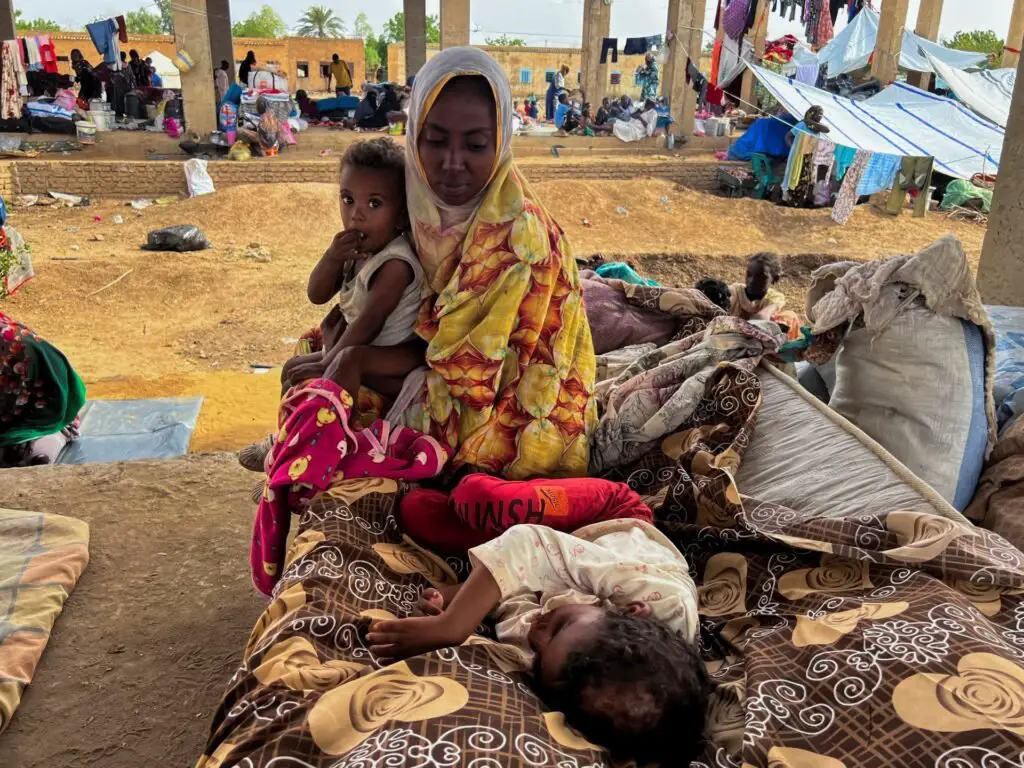In Sudan, the 20-month armed conflict between the paramilitary Rapid Support Forces (RSF) and the Sudanese Army (SAF) has killed at least 20,000 people and left about 25 million – half the country’s population – in severe hunger and desperate need humanitarian aid. 14 million Sudanese have now been displaced, with around 3.1 million seeking refuge outside the country, mainly in Chad, South Sudan, Uganda and Egypt.
As is often the case, children bear the brunt of this brutal war.
According to the medical organization Doctors Without Borders, known by its French initials MSF, between January and September 2024, about one in six people treated for war-related injuries such as gunshot, shrapnel and blast wounds at the Bashair Teaching Hospital in southern Khartoum were 15 years old or younger .
The medical team announced that they recently treated an 18-month-old baby, Riyad, who was hit by a stray bullet while he was sleeping in his family’s home. They said they managed to stabilize him but were unable to remove the bullet from his chest. Given the ongoing conflict and limited access to medical care, the future of Riyadh, as well as thousands of other war-injured, traumatized and orphaned children across the country, remains uncertain.
Sexual violence is also widespread in the conflict in Sudan. Forces under the command of the RSF and SAF have committed rape and other sexual and gender-based violence, the United Nations Independent International Fact-Finding Mission for Sudan revealed in its report released in October. The report accused both sides of using rape as a weapon of war, but said the RSF was behind the “vast majority” of documented cases and was responsible for “large-scale sexual violence,” including “gang rape and the abduction and detention of victims.” Conditions amounting to sexual slavery.”
Amid ongoing conflict, survivors of rape and other sexual violence struggle to access medical treatment, essential medications and psychological support services.
Many are wounded, traumatized and homeless.
With war crimes and other atrocities committed against men, women and even children with impunity every day, the conflict in Sudan has become the worst aspect of humanity.
As the people of Sudan prepare to begin another year hungry, wounded and afraid, the international community, and particularly the African organizations that purport to promote peace and stability in the region, have a responsibility to take meaningful action – including direct intervention.
So far, all efforts to end the suffering of the Sudanese through mediation between the warring parties have been unsuccessful.
Peace initiatives by the African Union (AU), the Intergovernmental Authority on Development (IGAD), the United States, Egypt and Switzerland have all failed to secure a sustainable ceasefire, a comprehensive peace agreement or meaningful protections for civilians.
In May 2023, just a month after the conflict began, the two warring parties in Saudi Arabia appeared to have reached a decisive agreement. They signed the Jeddah Declaration of Commitment to Protect Civilians in Sudan and agreed to “distinguish at all times between civilians and combatants and between civilian objects and military targets.” As part of the agreement, they also committed to “refrain from any attack that could be expected to accidentally cause harm to the civilian population” and “to protect all public and private facilities such as hospitals, water and electricity plants.” .
The agreement was intended to lead to a ceasefire lasting at least a week, but in the end it failed to stop atrocities against civilians, let alone the relentless fighting between the SAF and RSF, even if it lasted for 48 hours.
Since that U.S.-Saudi-led initiative failed some 19 months ago, no peace initiative has come close to ending the carnage in Sudan. In August, US-convened talks in Switzerland to end the war led to some progress in access to aid, but again failed to bring about a ceasefire.
Efforts to bring the warring parties to the negotiating table and appeal to their humanity to demand an end to attacks on civilians are clearly not working.
More needs to be done.
In its harrowing report, based on local witnesses, the UN fact-finding mission made clear what the country needs: an international peacekeeping force to protect civilians.
“Given the failure of warring parties to spare civilians, it is essential that an independent and impartial force with a mandate to protect civilians be deployed immediately,” UN mission chief Chande Othman said in September.
Regrettably, the Sudanese government rejected the call, just as it had already rejected IGAD’s similar call to deploy a regional peacekeeping force in July 2023. The military government in Khartoum – which has been in power since a civilian-led interim authority seized power in an October 2021 coup – calls any potential outside intervention, including peacekeeping missions focused solely on protecting civilians, a violation of the country’s sovereignty.
If the Sudanese government were able to provide protection to civilians, its opposition to outside intervention would be understandable. But it is clear – after 20 months of devastating war waged without regard for international humanitarian law – that no party in this war is able or sufficiently concerned to provide security and dignity to Sudan’s beleaguered civilian population.
Without the deployment of a regional peacekeeping mission with the support of the international community – a mission committed and clearly tasked with bringing an immediate end to the relentless attacks on civilians – the suffering of Sudan’s civilians will not end in the foreseeable future.
Today, the global community, and the AU in particular, faces a simple choice: remain passive as the death toll in Sudan continues to rise, or take meaningful and decisive action – even if it angers the Sudanese government – to address the crisis.
The regional body would lose all legitimacy if it stood by while innocent lives were lost to senseless violence in an endless war.
Therefore, it is time for the AU to intervene in the war in Sudan to protect civilians.
This would neither violate the sovereignty of the Sudanese state nor represent an excessive measure on the part of the Union.
According to Law 4(h) of the Constitutive Law of the African Union, to which Sudan consented in July 2000, the AU has the right to “intervene in a Member State in accordance with a decision of the Assembly in respect of serious circumstances, namely: war crimes, genocide and felonies against humanity.”
The situation in Sudan is undoubtedly “serious” given the overwhelming number of violations of international humanitarian law and human rights standards documented in detail by the UN mission and others. There is no doubt that the citizens of Sudan would significantly benefit from the physical protection provided by international peacekeepers.
Although Sudan’s vast territory and widespread warfare would pose significant challenges in ensuring the safety of millions of civilians, this task is not unattainable. By implementing effective planning and mobilizing sufficient numbers of troops, the AU has the potential to make a significant impact.
Sudan is a clear test of the AU’s ability to implement and sustain its broad mandate.
If it wants to realize its vision of an “integrated, prosperous and peaceful Africa, driven by its own citizens and a dynamic force on the world stage,” it cannot afford to continue to abandon the Sudanese people.
The views expressed in this article are the author’s own and do not necessarily reflect the editorial stance of Al Jazeera.





